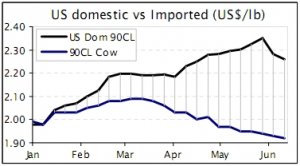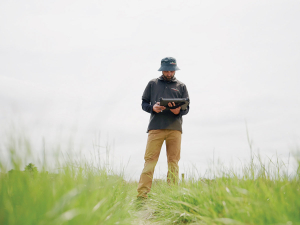When LFTB was removed from retail outfits, the only way to replace it was with domestic fresh lean beef which has sent prices soaring. There wasn't as dramatic spike in demand from foodservice operators who use imported beef as many had already stopped using LFTB. Another factor that is dampening US imported prices is the volume of imported beef. US beef imports this year are up 18% or 45,514t from the same period last year. Australian imports accounted for 37,405t of the increase while imports from Mexico are up by 9,023t because of it's drought.
US retailers are chasing fresh domestic lean beef rather than frozen imported beef seeing many don't use imported beef in their formulations, partly because of labeling requirements.
Popular Reads
Waikato dairy farmers enter 2025 regional council elections
Two Waikato dairy farmers and Federated Farmers leaders have thrown their hats in the ring for this year's Waikato Regional…Farmer anger over Joy's social media post
A comment by outspoken academic Dr Mike Joy suggesting that dairy industry leaders should be hanged for nitrate contamination of…Fonterra consumer business sale price jumps to $4.22b
The sale price of Fonterra’s global consumer and associated businesses to the world’s largest dairy company Lactalis has risen to…Open Country finalises acquisition of Miraka Limited
Open Country Dairy has finalised a deal to acquire 100% of Miraka.Featured
Long shot research by forage breeder nails pasture success
A tiny organism from the arid mountains of mainland Greece is facilitating a new way of growing healthier animals on farms across New Zealand.
Alliance announces capital raise roadshow
Alliance has announced a series of capital raise roadshow event, starting on 29 September in Tuatapere, Southland.
Editorial: Changes to Paris deal
OPINION: Everyone wants to go to heaven, but nobody wants to die.
Pāmu launches equity partnership at Mahiwi Farm
State farmer Pāmu (Landcorp) has announced a new equity partnership in an effort to support pathways to farm ownership for livestock farm operators.
Rural contractors call for overhaul of ag vehicle rules
Following a recent overweight incursion that saw a Mid-Canterbury contractor cop a $12,150 fine, the rural contracting industry is calling time on what they consider to be outdated and unworkable regulations regarding weight and dimensions that they say are impeding their businesses.
NZ seeks certainty on US tariff, says McClay
Trade Minister Todd McClay says his officials plan to meet their US counterparts every month from now on to better understand how the 15% tariff issue there will play out, and try and get some certainty there for our exporters about the future.
» Latest Print Issues Online
The Hound

A step too far
OPINION: For years, the ironically named Dr Mike Joy has used his position at Victoria University to wage an activist-style…
Save us from SAFE
OPINION: A mate of yours truly has had an absolute gutsful of the activist group SAFE.











